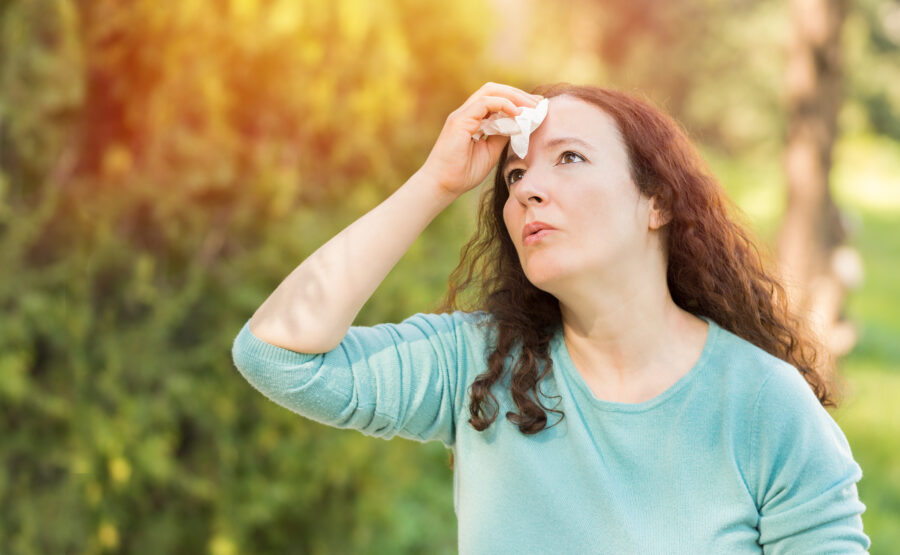Sweating is one of your body’s most natural responses, yet people tend to dislike it immensely. This distaste is evident in the plethora of sweat-thwarting interventions like antiperspirants, deodorants, sweat-resistant clothing, and even botox injections to stop the sweat glands from secreting sweat.
While sweating can be unsightly, smelly, and uncomfortable, it serves some wonderful purposes. Your body has an intricate system of two to four milli0on sweat glands. A healthy adult excretes about a quart of sweat every day, and not just during exercise. Your body will perspire even when not exercising or being exposed to heat. You may not realize just how much you benefit from this process. Here are five reasons to embrace this bodily function.
Regulating Body Temperature
Sweating is a built-in survival mechanism that is key to regulating your body. When you exercise, especially intensively, your body will start to sweat to maintain your internal temperature. Behind the scenes, your body will increase the blood flow to your skin, which widens the blood vessels around your sweat glands, and the sweat begins to flow. As the moisture evaporates, it cools your skin, and the blood accumulated under your skin. This process is critical for your body to stay in a state of homeostasis and for cellular function.
Flushing Out Toxins
Sweating is one of the best ways to detoxify your body from harmful toxins that would otherwise accumulate in your body. As your pores widen and sweat starts to flow, it helps flush out chemicals, alcohol, heavy metals, bacteria, cholesterol, and other foreign invaders. Sweating can help with complexion, acne, and other rashes because of this toxin removal.
A recent study showed that sweating could help release stubborn toxins that don’t even appear in blood tests. ” Many toxic elements appeared to be preferentially excreted through sweat. Presumably stored in tissues, some toxic elements readily identified in the perspiration of some participants were not found in their serum. Induced sweating appears to be a potential method for elimination of many toxic elements from the human body.” (1)
Many people dislike sweating because of the odor that ensues, but sweat is a scapegoat rather than the guilty party. Sweat itself has no odor; it is what it is mixed with that results in a foul smell. Bacteria on the skin surface, toxins, and excreted hormones are the true culprits. Therefore, if you notice a foul odor, you are likely toxic.
Hormone Release
A less commonly known benefit of sweating has to do with your brain and your hormones. Many people connect the dots between exercising and improved mood, but there is more to the story. Exercise releases “feel good” hormones called endorphins which can elevate your mood. Simultaneously, sweating sends signals to your brain, which amplifies this release.
A 2012 study examined the effect of exercise and sweating on pain tolerance and found, “Exercise activates endogenous analgesia in healthy individuals. The increased pain threshold following exercise is due to the release of endogenous opioids and activation of (supra)spinal nociceptive inhibitory mechanisms orchestrated by the brain. Exercise triggers the release of β-endorphins from the pituitary (peripherally) and the hypothalamus (centrally), which in turn enables analgesic effects by activating µ-opioid receptors peripherally and centrally, respectively. “(2)
Healing
A study that appeared in the National Library of Medicine in 2012 was titled, Identification of stem cell populations in sweat glands and ducts reveals roles in homeostasis and wound repair. (3) As part of the temperature regulation process, blood circulation also increases, making it easier for the immune system to deploy to injured or infected areas. You may notice that you sweat more when you are sick, and you should embrace this process. Sweating can help expel invaders and thus speed healing. Always allow your body to sweat while fighting a cold, cough, or flu.
Your sweat also contains healing, antimicrobial peptides. One, in particular, dermcidin, is particularly effective. A study published on nature.com showed “… that sweat plays a role in the regulation of human skin flora through the presence of an antimicrobial peptide.” This peptide starts in the sweat glands and reaches the skin’s surface to help fight infection.
Weight Loss
As a by-product of temperature regulation, your body has to expend more energy. To produce this energy, you are burning calories. When you exercise, you are likely drinking more water, which aids in weight loss. While this alone isn’t going to help you drop fifty pounds, it is part of a healthy bodily process that can help you optimize your weight and keep it off. Not to mention, you are typically exercising to induce sweating, so you get the added weight loss benefits of exercise itself.
In conclusion
The best way to work up a sweat is through exercise. As you do more high-intensity workouts, your sweat glands adapt and become more efficient at cooling your body and improving your endurance. MaxLiving has an excellent exercise program based on the principles of metabolic conditioning. For more information, go to www.maxt3.com.
About the Author
 Kimberly Roberto is a wife, mother of three, author, and business owner. She and her husband Fred have owned and operated a chiropractic and wellness clinic for the last 25 years. Kimberly and Fred have been a part of MaxLiving for since it’s onset. She co-authored the Maximized Living Nutrition Plans book in 2009 which sold over 10,000 copies and recently authored the MaxLiving’s Maximizing Your Pregnancy, Birth and Newbornbook. She’s a holistic nutritionist and maintains a healthy cooking/recipe blog. She is passionate about natural health and helping people reach their potential for health and wellness. She resides in Marietta, GA and their three children are now grown and attending college.
Kimberly Roberto is a wife, mother of three, author, and business owner. She and her husband Fred have owned and operated a chiropractic and wellness clinic for the last 25 years. Kimberly and Fred have been a part of MaxLiving for since it’s onset. She co-authored the Maximized Living Nutrition Plans book in 2009 which sold over 10,000 copies and recently authored the MaxLiving’s Maximizing Your Pregnancy, Birth and Newbornbook. She’s a holistic nutritionist and maintains a healthy cooking/recipe blog. She is passionate about natural health and helping people reach their potential for health and wellness. She resides in Marietta, GA and their three children are now grown and attending college.
References:
- https://pubmed.ncbi.nlm.nih.gov/21057782/
- https://biblio.ugent.be/publication/2964153/file/2964154
- https://pubmed.ncbi.nlm.nih.gov/22770217/






